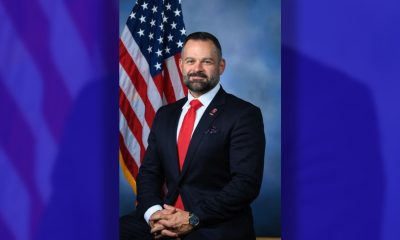Politics
Obama Calls for Spending Surge, Buoyed by Rising Economy

President Barack Obama waves during his arrival on Air Force One at Philadelphia International Airport, Thursday, Jan. 29, 2015, in Philadelphia. Obama traveled to Philadelphia and speak at the House Democratic Issues Conference. (AP Photo/Pablo Martinez Monsivais)
JOSH LEDERMAN, Associated Press
ANDREW TAYLOR, Associated Press
WASHINGTON (AP) — Declaring an end to “mindless austerity,” President Barack Obama called for a surge in government spending Thursday, and asked Congress to throw out the sweeping budget cuts both parties agreed to four years ago when deficits were spiraling out of control.
Obama’s proposed $74 billion in added spending — about 7 percent — would be split about evenly between defense programs and the domestic side of the budget. Although he’s sought before to reverse the “sequester” spending cuts, Obama’s pitch in this year’s budget comes with the added oomph of an improving economy and big recent declines in federal deficits.
Taking a defiant tone, Obama vowed not to stand on the sidelines as he laid out his opening offer to Congress during remarks in Philadelphia, where House Democrats were gathered for their annual retreat.
“We need to stand up and go on offensive and not be defensive about what we believe in,” Obama said. Mocking Republicans for their leaders’ newfound interest in poverty and the middle class, he questioned whether they would back it up with substance when it mattered.
Republicans promise to produce a balanced budget blueprint this spring even as they worry about Pentagon spending. The Senate’s No. 2 Republican, John Cornyn of Texas, dismissed the Obama proposals as “happy talk.” And Sen. Pat Toomey of Pennsylvania chided the president for “abandoning spending discipline.”
GOP lawmakers are focused primarily on reversing restraints on military spending, while Democrats and Obama are seeking new domestic dollars for education, research, health care and infrastructure. Republicans argue that spending more in so many areas would undo the hard-fought reductions in the country’s annual deficit.
They also oppose many of the tax hikes Obama has proposed to pay for the increased spending.
Neither party has tender feelings for the sequester, which cut bluntly across the entire federal budget and was originally designed more as a threat than as an actual spending plan. With the economy gaining steam while deficits decline, both parties have signaled they want to roll some of the cuts back. A bipartisan deal struck previously softened the blow by about a third for the 2014 and 2015 budget years.
Both parties are generally inclined to boost spending for the military, which is wrestling with threats from terrorism and extremist groups and has been strained by budget limits and two long wars. “At what point do we, the institution and our nation, lose our soldiers’ trust?” asked Gen. Raymond Odierno, the Army chief of staff, at a Senate hearing Wednesday.
Yet among congressional Republicans, there’s no unanimity about where more Pentagon funds should come from — a division within the GOP that Obama appeared eager to exploit.
Some House Republicans want to cut domestic agency budgets to free money for the military — an approach that failed badly for Republicans two years ago. Some are eying cuts to so-called mandatory programs such as Social Security and Medicare, while others want to ignore the spending restraints altogether.
“Whatever it takes within reason to get this problem fixed is what I’m willing to do,” said Sen. Lindsey Graham, R-S.C., adding that he would be willing to consider more tax revenue “just to get the damn thing done.”
The budget constraints stem from the hard-fought budget and debt bill of August 2011 that both parties negotiated and Obama signed into law. The threat of across-the-board cuts to virtually every federal agency was supposed to force Democrats and Republicans to compromise on smarter, less onerous spending cuts, but the measure kicked in when a supercommittee failed to reach an overall fiscal deal.
The White House said Obama’s budget would be “fully paid for” by cutting inefficient programs and closing tax loopholes — particularly a trust fund provision the White House has been eying. Spokesman Josh Earnest said that and a few other tax tweaks would not only pay for Obama’s increased spending but also offset middle-class tax cuts the president wants to create or expand.
At the same time, Earnest was quick to concede, “No president has ever put forward a budget with the expectation that Congress is going to pass it in its current form.”
Details of what Obama will ask for in his budget began to trickle out ahead of the budget’s formal release Monday. The Interior Department announced Obama would seek $1 billion for Native American schools, while Vice President Joe Biden said the budget would call for another $1 billion in aid for Central American nations.
At the Pentagon, Obama’s increases would help pay for next-generation F-35 fighter jets, for ships and submarines and for long-range Air Force tankers. On the domestic side, Obama has proposed two free years of community college and new or expanded tax credits for child care and spouses who both work.
In his meeting with House Democrats, Obama also insisted that Republicans must not be allowed to use a funding bill for the Homeland Security Department to try to quash his executive actions on immigration. The White House has called that approach a “dangerous view” that would risk national security.
___
Lederman reported from Philadelphia. Associated Press writers Jim Kuhnhenn and Nedra Pickler in Washington contributed to this report.
Copyright 2015 The Associated Press. All rights reserved. This material may not be published, broadcast, rewritten or redistributed.
Activism
Oakland Post: Week of December 31, 2025 – January 6, 2026
The printed Weekly Edition of the Oakland Post: Week of – December 31, 2025 – January 6, 2026

To enlarge your view of this issue, use the slider, magnifying glass icon or full page icon in the lower right corner of the browser window.
Activism
2025 in Review: Seven Questions for Assemblymember Lori Wilson — Advocate for Equity, the Environment, and More
Her rise has also included several historic firsts: she is the only Black woman ever appointed to lead the influential Assembly Transportation Committee, and the first freshman legislator elected Chair of the California Legislative Black Caucus. She has also been a vocal advocate for vulnerable communities, becoming the first California legislator to publicly discuss being the parent of a transgender child — an act of visibility that has helped advanced representation at a time when political tensions related to social issues and culture have intensified.

By Edward Henderson, California Black Media
Assemblymember Lori D. Wilson (D-Suisun City) joined the California Legislature in 2022 after making history as Solano County’s first Black female mayor, bringing with her a track record of fiscal discipline, community investment, and inclusive leadership.
She represents the state’s 11th Assembly District, which spans Solano County and portions of Contra Costa and Sacramento Counties.
Her rise has also included several historic firsts: she is the only Black woman ever appointed to lead the influential Assembly Transportation Committee, and the first freshman legislator elected Chair of the California Legislative Black Caucus. She has also been a vocal advocate for vulnerable communities, becoming the first California legislator to publicly discuss being the parent of a transgender child — an act of visibility that has helped advanced representation at a time when political tensions related to social issues and culture have intensified.
California Black Media spoke with Wilson about her successes and disappointments this year and her outlook for 2026.
What stands out as your most important achievement this year?
Getting SB 237 passed in the Assembly. I had the opportunity to co-lead a diverse workgroup of colleagues, spanning a wide range of ideological perspectives on environmental issues.
How did your leadership contribute to improving the lives of Black Californians this year?
The Black Caucus concentrated on the Road to Repair package and prioritized passing a crucial bill that remained incomplete during my time as chair, which establishes a process for identifying descendants of enslaved people for benefit eligibility.
What frustrated you the most this year?
The lack of progress made on getting Prop 4 funds allocated to socially disadvantaged farmers. This delay has real consequences. These farmers have been waiting for essential support that was promised. Watching the process stall, despite the clear need and clear intent of the voters, has been deeply frustrating and reinforces how much work remains to make our systems more responsive and equitable.
What inspired you the most this year?
The resilience of Californians persists despite the unprecedented attacks from the federal government. Watching people stay engaged, hopeful, and determined reminded me why this work matters and why we must continue to protect the rights of every community in our state.
What is one lesson you learned this year that will inform your decision-making next year?
As a legislator, I have the authority to demand answers to my questions — and accept nothing less. That clarity has strengthened my approach to oversight and accountability.
In one word, what is the biggest challenge Black Californians are facing currently?
Affordability and access to quality educational opportunities.
What is the goal you want to achieve most in 2026?
Advance my legislative agenda despite a complex budget environment. The needs across our communities are real, and even in a tight fiscal year, I’m committed to moving forward policies that strengthen safety, expand opportunity, and improve quality of life for the people I represent.
Activism
2025 in Review: Seven Questions for Assemblymember Tina McKinnor, Champion of Reparations, Housing and Workers’ Rights
In 2025, McKinnor pushed forward legislation on renters’ protections, re-entry programs, reparations legislation, and efforts to support Inglewood Unified School District. She spoke with California Black Media about the past year and her work. Here are her responses.

By Joe W. Bowers Jr., California Black Media
Assemblymember Tina McKinnor (D-Inglewood) represents
California’s 61st Assembly District.
As a member of the California Legislative Black Caucus (CLBC),
McKinnor was elected in 2022. She chairs the Los Angeles County Legislative Delegation and leads the Assembly Public Employment and Retirement Committee. McKinnor also served as a civic engagement director, managed political campaigns, and worked as chief of staff for former Assemblymembers Steven Bradford and Autumn Burke.
In 2025, McKinnor pushed forward legislation on renters’ protections, re-entry programs, reparations legislation, and efforts to support Inglewood Unified School District. She spoke with California Black Media about the past year and her work. Here are her responses.
Looking back on 2025, what do you see as your biggest win?
Assembly Bill (AB) 628. If rent is $3,000, people should at least have a stove and a refrigerator. It’s ridiculous that people were renting without basic appliances.
I’m also proud that I was able to secure $8.4 million in the state budget for people coming home from incarceration. That includes the Homecoming Project, the menopause program for incarcerated women, and the Justice Leaders Program.
How did your leadership help make life better for Black Californians this year?
After the Eaton Fire, I pushed to get the same kind of support for affected areas that wealthier regions get after disasters.
I also did a lot of work building political power— establishing the Black Legacy PAC and California for All of Us PAC so we could support Black candidates and educate voters. We also called voters to make sure they understood Prop 50.
People need to understand this: there are only 12 Black legislators in the Capitol. Folks act like we can just walk in and pass reparations, but that’s not how it works.
What frustrated you most this year?
The governor did not have the political will to sign these bills: AB 57 and AB 62. They both passed overwhelmingly in the Assembly and the Senate. We did the work. The only person who didn’t have the political will to sign them was the governor.
The public needs to ask the governor why he didn’t sign the bills. We can’t keep letting people off the hook. He has to answer.
I also introduced AB 51 — the bill to eliminate interest payments on Inglewood Unified School District’s long-standing state loan — held in the Appropriations Committee. That was frustrating,
What inspired you most in 2025?
The civil rights trip to Alabama was life changing. We visited the Legacy Museum and the National Memorial for Peace and Justice. We took members of the Black, Latino, Jewish, and API caucuses with us. It changed all of us.
People aren’t always against us — they just don’t know our history.
What’s one lesson from 2025 that will shape how you approach decisions next year?
The legislative trip to Norway taught me that collaboration matters. Government, labor, and industry sit down together there. They don’t make villains. Everybody doesn’t get everything they want, but they solve problems.
What’s the biggest challenge facing Black Californians in one word?
Inequity. It shows up in housing, wealth, stress – all these things.
What’s the number one goal you want to accomplish in 2026?
Bringing back AB 57 and AB 62, and securing money for the Inglewood Unified loan interest forgiveness.
-

 Bay Area3 weeks ago
Bay Area3 weeks agoPost Salon to Discuss Proposal to Bring Costco to Oakland Community meeting to be held at City Hall, Thursday, Dec. 18
-

 Activism3 weeks ago
Activism3 weeks agoMayor Lee, City Leaders Announce $334 Million Bond Sale for Affordable Housing, Roads, Park Renovations, Libraries and Senior Centers
-

 Activism3 weeks ago
Activism3 weeks agoOakland Post: Week of December 10 – 16, 2025
-

 Activism3 weeks ago
Activism3 weeks agoOakland School Board Grapples with Potential $100 Million Shortfall Next Year
-

 Arts and Culture3 weeks ago
Arts and Culture3 weeks agoFayeth Gardens Holds 3rd Annual Kwanzaa Celebration at Hayward City Hall on Dec. 28
-

 Activism3 weeks ago
Activism3 weeks ago2025 in Review: Seven Questions for Black Women’s Think Tank Founder Kellie Todd Griffin
-

 Advice3 weeks ago
Advice3 weeks agoCOMMENTARY: If You Don’t Want Your ‘Black Card’ Revoked, Watch What You Bring to Holiday Dinners
-

 Activism3 weeks ago
Activism3 weeks agoAnn Lowe: The Quiet Genius of American Couture


























































